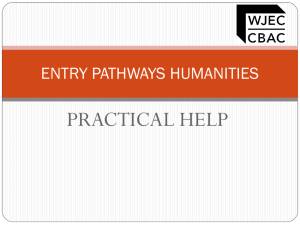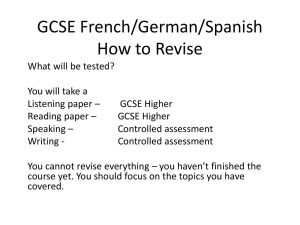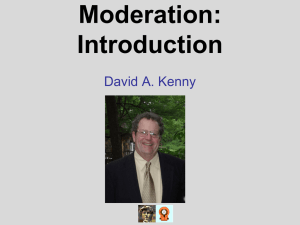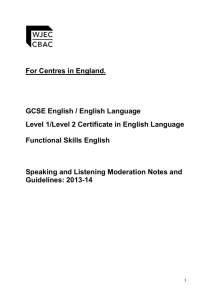GCSE English Language
advertisement
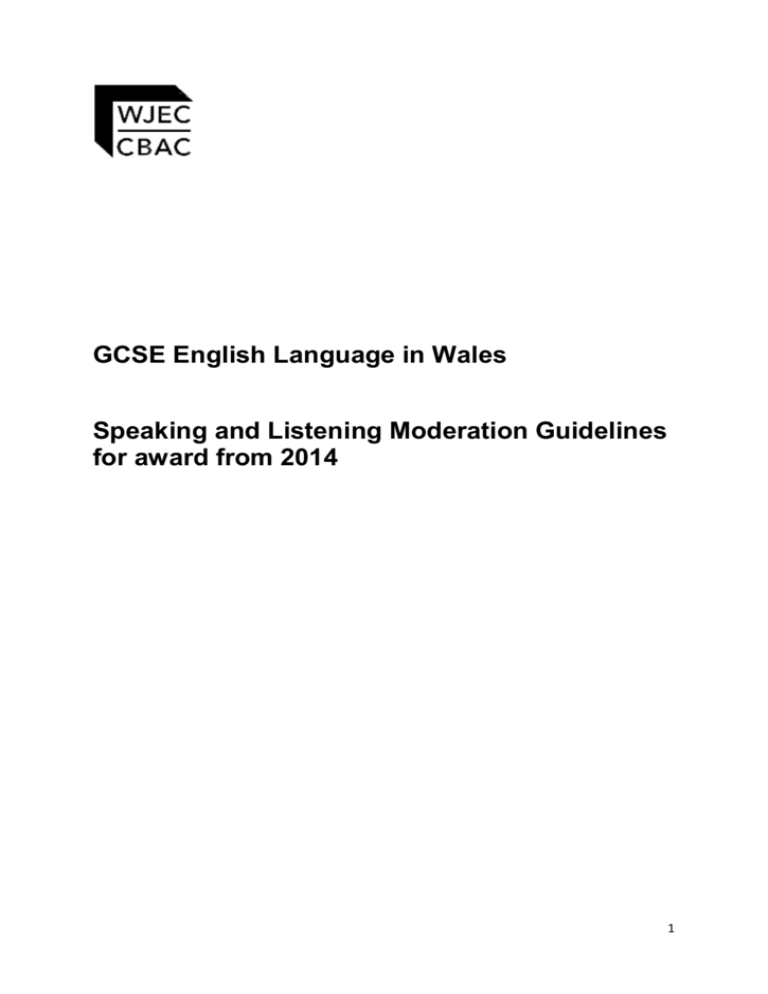
GCSE English Language in Wales Speaking and Listening Moderation Guidelines for award from 2014 1 GCSE English Language Speaking and Listening Guidelines The controlled assessment must contain two Speaking and Listening tasks including real life uses and audiences. Students must be given the opportunity to: create and sustain roles and points of view, work in formal and informal situations, speak individually and in group situations and ask and answer questions. The two tasks must cover the following areas: A presentation or talk, answering questions in a formal or informal situation. A group discussion that has a local/community/workplace focus or topic where candidates have a role and sustain a point of view. Task Setting Candidates are required to complete a minimum of two Speaking and Listening tasks. Exemplar tasks will be provided by WJEC, but centres may design their own tasks to suit their centre-specific circumstances, providing these tasks follow the guidance from WJEC. Tasks should be replaced on a regular basis. The tasks will need to cover the following: Presenting and listening to information and ideas Responding appropriately to the questions and views of others Making a range of effective contributions Using creative approaches to explore questions, solve problems and develop ideas Reflecting and commenting critically on their own and others’ use of language Participating in a range of real-life contexts in and beyond the classroom, adapting talk appropriately to situation and audience Centres must ensure that at least one of the tasks has a real life use. Task Taking Candidates should complete all work under formal supervision. Preparation work may be completed under limited supervision. Candidates’ access to resources such as stimulus material for discussions or role play and users of language beyond the classroom will be determined by the centre in line with WJEC guidelines. Teacher support should be limited to explanation of tasks, details of which should be recorded as part of the assessment. If teacher intervention is used, for example to prompt or question a candidate, this should also be noted and taken into consideration when the assessment is made. The work of individual candidates may be informed by working with others, for example in discussion groups and role-play activities, but each candidate must provide responses sufficient to be assessed individually. It is expected that an individual response/presentation will last up to five minutes, although this might be longer if questions are asked. Group discussions and discussions in role could be rather longer, depending on the nature of the topic and the ability of the candidates. 2 Task Marking Candidates should be assessed by a teacher either directly at the time of the response or by viewing an electronic visual recording of a candidate’s response. Reference should be made to the criteria to place a candidate’s response in the appropriate band area. The two tasks must include real life uses and audiences. Assessment should focus on: presentation or talk, answering questions, in either a formal or informal situation group discussion that has a local community / workplace focus or topic where candidates have a role and sustain a point of view. The total mark will be reached by adding the two marks (out of 20) together to produce a final mark out of 40. The assessment of Speaking and Listening will feature regularly on the agenda of the annual round of CPD meetings held in the autumn term. Reference will be made to exemplar material, including standardisation DVDs. A representative from each centre will be expected to attend each year’s meeting. Sample of Records and Unit 4 Form (Outline of Activities) Details of Speaking and Listening tasks for each teaching group must be given on the Outline of Activities forms, and submitted by 1 December for January entries and 5 May for June entries (forms attached). From June 2014, all GCSE English Language units will be offered in both January and June. It is the centre’s responsibility to download these forms from the WJEC open website (www.wjec.co.uk) and forward them to the Speaking and Listening moderator. It is a requirement that centres put in place systems of recording and internal moderation. The form of records is not prescribed by WJEC but the board has produced a simple assessment sheet which is very straightforward to use and which has already been adopted by a number of participating centres (form attached). A sample of records for this unit will need to be submitted to the moderator for each January and June session where candidates are entered, along with the Outline of Activities forms. The submission deadlines are 1 December for January entries and 5 May for June entries. Speaking and Listening marks should be submitted via the WJEC secure website. The system is live for GCSE and Level 1/Level 2 Certificate from 10 March and the deadline for the submission of marks is 30 March. For Functional Skills, the system is live from 6 April until 25 May. It is a requirement of GCSE English/English Language, Functional Skills English and Level 1/Level 2 Certificate in English Language qualifications that an outline of activities used in each teaching group must be submitted on the appropriate form to the consultative moderator. The ‘Outline of Activities’ form can be found in the specification and is also available to download from the website: GCSE English: www.wjec.co.uk/englishgcse 3 In addition to the Outline of Activities forms, it is a requirement of the above specifications that a sample of speaking and listening records be sent to the consultative moderator. The sample will comprise five records per teacher. Where one teacher is responsible for teaching two or more classes, it is acceptable that one sample of five records be submitted for that teacher. Of the five records per teacher, one must be from the top and one must be from the bottom of the range of candidates for whom they have a teaching responsibility. The other three records should cover a representative range of achievement within the teaching group/s. Where a teacher is responsible for teaching more than one of the above listed qualifications, a sample will be required for each specification. Please note that the submission of the sample of records for Speaking and Listening refers only to Unit 4 Using Language, not the Spoken Language Study. Separate instruction will be given with regard to the submission of the samples for this part of the unit along with the written controlled assessments tasks. Should you have any queries, please contact Julia Harrison (Julia.harrison@wjec.co.uk) Moderation Moderation will take place at two levels: 1. Centres are required to ensure that internal moderation has taken place before final submission of marks, so that standards applied are in line with those established in exemplar material, and so that a reliable overall rank order has been established within the centre. Suitable methods of achieving this will depend on the individual centre’s organisation and policy. However, a sample of each teacher’s candidates must be reassessed by another teacher. Training DVDs will be produced on a regular basis. All staff teaching GCSE English Language must meet to discuss the training DVDs, as an aid to task setting, assessment, and standardisation of marking. 2. Statistical analysis of results in each component will be carried out each year. If an ‘atypical profile’ for the Speaking and Listening element is discovered, the centre will be notified and discussion undertaken to clarify the situation. This could lead to an advisory visit or, in the most serious cases, a moderation visit. Advisory visits will be made by Consultative Moderators, who will assess a group of candidates undertaking a range of tasks. The person responsible for internal moderation should also assess the same candidates. Discussion of marking standards will be an integral part of the visit. Should there be concerns, an additional visit could be made in the following year, or, for very serious cases, a formal moderation visit would be made. Although WJEC does not feel it appropriate to be prescriptive about the nature of the recording and internal moderation systems adopted by centres, it is important to emphasise that discussion of whatever systems are in place should provide a 4 major focus of discussion with the consultative moderator, and that candidates’ records should be available for viewing on the day. Task Setting Guidance Please refer to the GCSE English Language specifications for guidance on task setting. Centre Visits Advisory Visits: Consultative Moderators will be appointed with responsibility for a group of centres. A programme of advisory visits will be arranged for the autumn term (November and December). These visits will cover: (a) All centres in the first year of the course. (b) Centres selected so that all centres are visited at least once every three years. (c) Centres where statistical analysis of marks across all three components in the previous year’s examination reveals an atypical profile for Speaking and Listening. (d) Centres where the Consultative Moderator has concerns after an advisory visit in the previous year. The emphasis of these visits will be on advice and guidance. The moderator will contact the centre in September/October to arrange a mutually convenient time for the visit in November, which will last about two hours and focus on a group of at least six students taking part in Speaking and Listening assignments. Students should be seen in more than one activity and thus bring different criteria into play. The format for the visit will be agreed between the centre and moderator, to include the following aspects: (i) (ii) Discussion of marking standards, based upon assessment of a group of at least six students by a teacher (preferably the person responsible for internal moderation) and the moderator. Discussion of the content of the Speaking and Listening element of the course; methods of recording, task-setting and internal moderation. This part of the monitoring process is entirely distinct from moderation arrangements and will not affect the actual assessments that are in progress for these students. Your consultative moderator will generally not be the person who will make a moderation visit, should one prove necessary. Assessment Exercise: Selection of Students for an Advisory Visit Since the purpose of the assessment exercise is to provide a focus for discussion of the application of criteria and of marking standards, to inform marking rather than to moderate marks, the selection of students is not a major issue. They could be from a single teaching group (indeed, the activity could be part of a normal teaching session); alternatively the visit could be integrated with internal moderation procedures. If students are from different 5 groups, it will obviously be important that they can work effectively together. In the school setting it would be acceptable to use Year 10 students, although this would generally apply to new centres. N.B. For the academic years 2012-2014 it is important to note that Year 10 will be following a different programme of study than Year 11. It is not necessary to cover the ability range of the entry (which will be a key requirement for moderation visits), and the centre could suggest looking at a particular grade area. However, it will normally be helpful to have something of a range within the group. A minimum of six students is stipulated, and it is certainly not necessary to involve more. However, it may be that the centre wishes to use activities based for example on two groups of four students. Where the visit takes place in the context of a larger group, it is important that the moderator and the teacher can focus on the selected students and that others' contributions do not provide a distraction. Open Website - www.wjec.co.uk/englishgcse There are a number of documents on the WJEC open website relating to Speaking and Listening, including: Specifications Outline of Activities form Teachers’ Guide We also recommend that you sign up to the WJEC GCSE English e-bulletin and/or follow us on Twitter. Further information on how you can subscribe can be found here: www.wjec.co.uk/englishgcse Secure Website (www.wjecservices.co.uk) GCSE The Speaking and Listening DVD commentary for GCSE English Language is available to download from the secure website. To access it, log on and click on 'Resources PDF Downloads', then 'Controlled Assessment Material' and ‘GCSE English/English Language/English Literature’. 6 7 GCSE ENGLISH LANGUAGE - Speaking and Listening Record Form Centre: Candidate's Name: Centre No: Candidate's No: Context 1 2 1 Presentation Group Discussion Date C o n t e x t Description of activity Teacher comment Mark / 20 2 Final mark /40 Declaration by Teacher: I confirm that the candidate's work was conducted under the conditions laid out in the specification. Teacher's signature: Date: 8 GCSE English Language GCSE ENGLISH / ENGLISH LANGUAGE SPEAKING AND LISTENING: OUTLINE OF ACTIVITIES Centre Name Unit 4 Centre No. Teacher's Name Please read the notes overleaf before completing this form. Outline below two activities which will be used as evidence for the assessment of Speaking and Listening in your teaching group. Please number them 1 and 2. To meet specification requirements one of these activities must involve a group discussion (that has a local/community/workplace focus or topic) and one must be a presentation. Forms (one per teaching group) must be returned to the consultative Speaking and Listening Moderator by 1 December for January entries and 5 May for June entries. Signed Date 9 Notes 1. In view of the range of work which may contribute to the assessment of Speaking and Listening, you are asked to outline two activities which you expect to be used as evidence for this assessment, rather than to make a comprehensive list. You may include work still to be undertaken. 2. Where appropriate, the activity should be briefly contextualised. 3. Where a teacher is responsible for more than one teaching group, there is no need to submit a separate form for each group. A single form may be returned on behalf of the centre as a whole, providing it reflects the approach across teaching groups. 10
